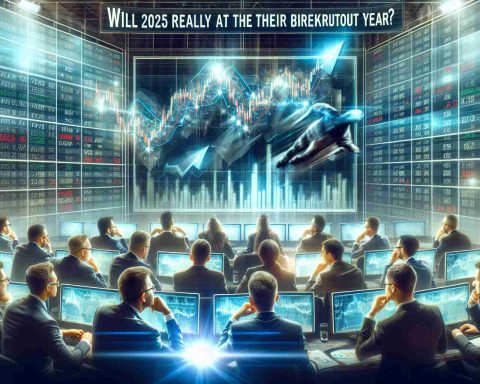- Jim Cramer highlights the unexpected resilience of the S&P index despite political and economic challenges.
- Market stability is subtly reinforced by the perception of the President’s business-friendly policies.
- Merck & Co. faces significant challenges in China, particularly with its GARDASIL HPV vaccine, causing a 31.7% drop in stock value this year.
- Cramer emphasizes the paradox of systemic strategies coexisting with specific company challenges.
- Confidence, or its lack, is crucial in shaping market directions, whether through presidential policies or corporate struggles.
In the bustling world of Wall Street, where whispers echo through skyscraper canyons, Jim Cramer stands as a clarion voice of reason amidst the chaos. His recent musings on CNBC’s Squawk on the Street lit a torch on how unexpected resilience grips the S&P index. Despite tremors from trade wars and the tides of a new administration, the index holds firm. Cramer unveils that the quiet confidence in the President’s business-friendly aura subtly reinforces market stability. His reflections ripple beyond mere financial conjectures, suggesting a landscape where presidential strategies, no matter how abrasive, wear the veneer of success.
Against this backdrop, Merck & Co., Inc. (NYSE:MRK) emerges as a case study in the broader tale of market impulse. A pharmaceutical titan, Merck grapples with its own storm, churned up by discordant winds in China. Its prized GARDASIL HPV vaccine faces a prickly blockade, corralling the company’s ambitions as anti-corruption audits stall inventory in the Middle Kingdom. This year alone, the lackluster embrace of GARDASIL accounted for a 31.7% slide in Merck’s stocks, revealing a chink in its armor that makes even the staunchest investor flinch.
Cramer’s narrative illustrates a paradox where grand systemic strategies coexist with company-specific travails. As he reads the room of global finance, the key takeaway resonates: confidence—or its absence—is a keystone. Whether in presidential policy trickling into economic shores or in the microcosm of Merck’s struggles in China, belief shapes trajectories. The message is clear: in markets as in life, faith often dictates the spoils.
In-Depth Analysis: How Jim Cramer’s Insights Illuminate Market Stability Amid Economic Turmoil
How-To Steps & Life Hacks: Navigating Market Volatility
Navigating the stock market can be a daunting task, but with the right strategies, investors can position themselves for success even in turbulent times. Here’s how:
1. Diversify Your Portfolio: Spread investments across different sectors to minimize risk. Including international stocks can also offset domestic uncertainties.
2. Stay Informed: Regularly follow market analysts like Jim Cramer, and keep up with economic news. Sign up for financial newsletters or podcasts from reputable sources to stay updated.
3. Focus on Fundamentals: Invest in companies with strong fundamentals. Look for low debt levels, strong cash flow, and competitive advantages.
4. Utilize Stop-Loss Orders: Use these to limit potential losses. A stop-loss order will automatically sell a stock once it reaches a certain price.
5. Long-Term Perspective: Resist the urge to make impulsive decisions based on short-term market fluctuations. Consider market forecasts and focus on long-term growth.
Real-World Use Cases and Market Trends
Jim Cramer’s insights into the resilience of the S&P index emphasize the interconnected nature of global markets and governmental policies. Here are some real-world applications:
– Investment in Indices: Given the resilience of indices like the S&P 500, consider ETFs or index funds that track these markets for steady growth.
– Pharmaceuticals and Emerging Markets: Companies like Merck are navigating complex international landscapes. Investors need to monitor geopolitical developments, especially in key markets like China and India.
Market Forecasts & Industry Trends
According to a report from McKinsey & Company, the global economy is expected to continue experiencing volatility due to geopolitical tensions and shifts in trade policies. Nevertheless, sectors like technology, healthcare, and renewable energy are poised for growth, driven by technology advancements and policy support.
Reviews & Comparisons
Merck’s GARDASIL issue in China illustrates the challenges pharmaceutical companies face in new markets. Comparatively, companies like Pfizer have navigated international regulations more successfully, using partnerships and local collaborations.
– Strengths: Merck’s research and development capabilities are renowned, especially in the oncology field.
– Weaknesses: Over-reliance on specific markets like China can pose risks, as seen with GARDASIL.
Controversies & Limitations
– Geopolitical Risks: Companies operating in foreign markets are subject to local regulations and political climates, as demonstrated by Merck’s experience in China.
– Market Speculation: While Jim Cramer offers valuable perspectives, it’s vital to view them critically and understand they are not investment guarantees.
Actionable Recommendations
1. Research and Monitor: Continually research companies and markets. Tools like Yahoo Finance and Bloomberg offer free insights.
2. Adjust Based on Trends: Be flexible; adjust your portfolio based on emerging market trends and economic reports.
3. Strong Network: Build a network of knowledgeable investors and industry professionals for support and advice.
4. Education: Engage in financial literacy and investment courses, many of which are available online for free or at a low cost.
By understanding the insights provided by market voices like Jim Cramer and recognizing the intricate dance between macroeconomic policies and individual corporate health, investors can better prepare for and capitalize on market movements. Remember, knowledge and adaptability are key assets in navigating the financial landscape.
Explore more about the strategies Jim Cramer suggests through CNBC.









